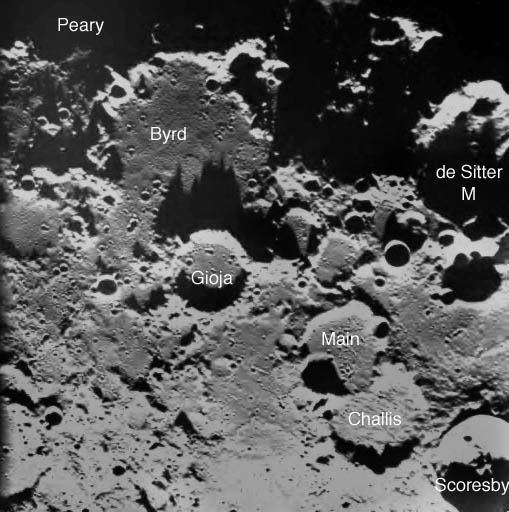Difference between revisions of "April 15, 2005"
| Line 3: | Line 3: | ||
<table width="85%" border="0" align="center" cellpadding="6" cellspacing="2"> | <table width="85%" border="0" align="center" cellpadding="6" cellspacing="2"> | ||
<tr> | <tr> | ||
| − | |||
</tr> | </tr> | ||
</table> | </table> | ||
| Line 22: | Line 21: | ||
<p align="left">The European Space Agency has re-released a Smart-1 image of the Moon. The Dec 29 image (above) and a new one from Jan 19 show the North Polar region. The images are meant to help identify regions of eternal light for consideration as possible future base locations. This Smart-1 image does reach the pole - whch is on the far rim of the crater Peary, which is totally in shadow behind Byrd. The press release for this image told me something I didnt know: in 1879 Camille Flammarion suggested that there might be lunar polar mountains that would always be illuminated - <i>pics de lumiere eternelle</i>. I have a vague recollection that Schroter may have previously mentioned the same idea - is there a historian of lunar science who knows? This image was taken from 5500 km elevation, before the spacecraft entered its lower science orbit. The resolution is less than Orbiter IV images. I added the names and somewhat improved the tonal balance. I eagerly await the full commisioning of Smart-1 and a steady flow of wonderful new images. | <p align="left">The European Space Agency has re-released a Smart-1 image of the Moon. The Dec 29 image (above) and a new one from Jan 19 show the North Polar region. The images are meant to help identify regions of eternal light for consideration as possible future base locations. This Smart-1 image does reach the pole - whch is on the far rim of the crater Peary, which is totally in shadow behind Byrd. The press release for this image told me something I didnt know: in 1879 Camille Flammarion suggested that there might be lunar polar mountains that would always be illuminated - <i>pics de lumiere eternelle</i>. I have a vague recollection that Schroter may have previously mentioned the same idea - is there a historian of lunar science who knows? This image was taken from 5500 km elevation, before the spacecraft entered its lower science orbit. The resolution is less than Orbiter IV images. I added the names and somewhat improved the tonal balance. I eagerly await the full commisioning of Smart-1 and a steady flow of wonderful new images. | ||
</p> | </p> | ||
| − | <blockquote><p align="right">— [mailto:tychocrater@yahoo.com Chuck Wood]</blockquote> | + | <blockquote> |
| − | <p align="left" | + | <p align="right">— [mailto:tychocrater@yahoo.com Chuck Wood]</blockquote> |
| + | <p align="left"><b>Related Links:</b><br> | ||
[[iv_140_h3.jpg|Lunar Orbiter IV View]] | [[iv_140_h3.jpg|Lunar Orbiter IV View]] | ||
<br>[http://sci.esa.int/science-e/www/object/index.cfm? Dec 29, 2004 Smart Images] | <br>[http://sci.esa.int/science-e/www/object/index.cfm? Dec 29, 2004 Smart Images] | ||
Revision as of 18:20, 17 January 2015
Back to the Pole
Image Credit: SMART-1
|
|
Back to the Pole The European Space Agency has re-released a Smart-1 image of the Moon. The Dec 29 image (above) and a new one from Jan 19 show the North Polar region. The images are meant to help identify regions of eternal light for consideration as possible future base locations. This Smart-1 image does reach the pole - whch is on the far rim of the crater Peary, which is totally in shadow behind Byrd. The press release for this image told me something I didnt know: in 1879 Camille Flammarion suggested that there might be lunar polar mountains that would always be illuminated - pics de lumiere eternelle. I have a vague recollection that Schroter may have previously mentioned the same idea - is there a historian of lunar science who knows? This image was taken from 5500 km elevation, before the spacecraft entered its lower science orbit. The resolution is less than Orbiter IV images. I added the names and somewhat improved the tonal balance. I eagerly await the full commisioning of Smart-1 and a steady flow of wonderful new images. Related Links: Tomorrow's LPOD: Ridgeback Crater |
|
Author & Editor: Technical Consultant: Contact Translator: A service of: |
COMMENTS?
Register, and click on the Discussion tab at the top of the page.




